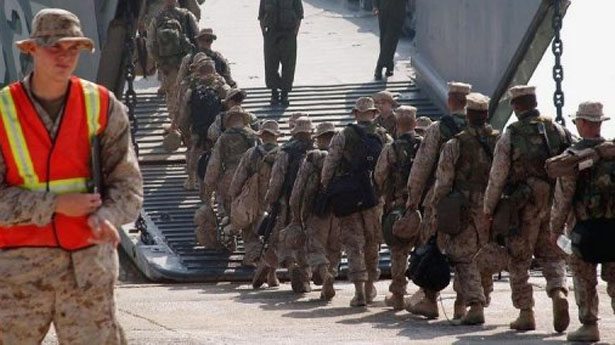Thousands of US Marines could leave Japan’s Okinawa island before a controversial American base is closed, Washington and Tokyo announced Wednesday, in the latest twist in a long-running saga.
In a densely-worded joint statement, the two sides said they were talking about “delinking” the redeployment of 8,000 Marines from a 2006 agreement to close the base in the crowded urban area of Futenma.
It has been widely reported in Japan that Washington has now set its sights on shifting 4,700 Marines to Guam without waiting for Japan to stop its foot-dragging over the accord, which would see a new facility built in a sparsely populated coastal area.
The original agreement offered the carrot of a Marine drawdown in exchange for Okinawans allowing the construction of an airstrip at Henoko.
But local opposition to the plan has been fierce, with feelings running high on the tropical island chain that because it is home to around half of the 50,000 US troops in Japan, it already shoulders a big enough burden.
The two sides said Wednesday that the move to Henoko remained the “only viable way forward” but that it may no longer be contingent on Marines leaving.
The statement, issued in Washington and Tokyo, said the US was looking to “achieve a more geographically distributed, operationally resilient and politically sustainable force structure in” Asia, and the relocation of Marines to Guam was an essential part of that.
“Our two governments have started official discussions to adjust our current posture plans… in particular delinking both the movement of Marines to Guam and resulting land returns… from progress on the Futenma Replacement Facility.”
Tokyo and Washington have squabbled since 2009 over the fate of the base, where locals have long complained of aircraft noise, the risk of accidents, and crime associated with a large contingent of young servicemen.
The dispute helped to bring down former prime minister Yukio Hatoyama who mused openly about moving the base off the island then backtracked to appease Washington, which maintains that a shifting security environment in east Asia means a Marine presence on Okinawa has crucial strategic value.
Hatoyama’s successor, Naoto Kan, pledged to relocate Futenma, as originally agreed, but was brought down by domestic issues before he could fulfil his promise.
Current Prime Minister Yoshihiko Noda told parliament on Wednesday he had no intention of abandoning the plan to close Futenma.
“We definitely have to avoid fixing the site of the Futenma air base at the current place. There’s no change in our plans to relocate the base to Henoko,” he said.
The original proposal to shift Futenma dates back to the 1990s when the US military was looking to assuage local anger following a series of incidents including the gang rape of a schoolgirl.
But it has become mired in a mix of local and national politics and has reached deadlock in recent years.
Foreign Minister Koichiro Gemba said Wednesday’s agreement to begin talks on reducing US troop numbers would at least provide a way forward.
“The government needs to carefully explain to the people of Okinawa about the need to remove the risk around the Futenma airbase as quickly as possible,” he said.
“Do we choose to stay like this, where nothing moves on? It is better to choose an option that would lessen the burden on Okinawa.”











